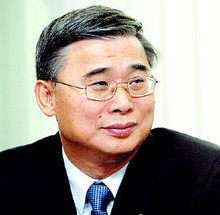 |
Thirdly and finally, choices and focus must be strategic in nature. North Korean human rights are important and financial sanctions are important, but however important they may be we are at a fork in the road. One way leads to peace for the Korean peninsula, and the other leads to tragic dispute. No issue is as pressing as the North Korean nuclear issue when nuclear proliferation stands as a serious threat to the peace of all humanity. The approach we need to take, then, is that the nuclear issue gets first priority and the most attention over all other issues relating to North Korea. These suggestions, along with the need for direct talks between Pyongyang and Washington, are actually what the Korea government has consistently recommended to the U.S. government. Though it is something like making up for missing a good chance, it looks like the U.S. is stepping closer to these suggestions only after paying a high price in the form of Pyongyang’s test of a nuclear device. The U.S. must stop avoiding direct talks with Pyongyang, and treating them as if to merely allow bilateral talks is a form of "reward." It must remember that bilateral discussion is the basic format for conflict resolution. The U.S. must also change the narrow-minded approach that seeks to divide the nations party to the process into factions of "us" versus "them." It must stop acting as if it is unacceptable for one among the nations to be a "mediator," while in the meantime it finds no fault with anothor being a "facilitator." North Korea, in turn, needs to quit with its old behavior if it has any intention of giving up its nuclear program through negotiation. It may think the brinkmanship and threat diplomacy had the desired effect because of its nuclear test, but if you consider the negative image and low level of confidence that this act earned within the international community, the only thing the North managed to do was show off. In fact, the security guarantee and economic aide the North would receive if it gives up its nuclear program would be the same as it would have been prior to its nuclear test, so the North’s practical interests were to be found all along in accepting China’s and South Korea’s call to return to the talks, not in testing a nuclear device. In the meantime, the South Korean government needs to seek a full restoration of inter-Korean relations without delay, once there has been a certain amount of progress achieved at the six-party talks. There will be limits to how the situation can be turned around in inter-Korean relations given the extreme context of the North’s nuclear test, but the current status of relations is something that is both exceptional and temporary. Basically, when progress in both the nuclear issue and in inter-Korean relations start to influence each other in a positive way, the political situation on the peninsula will be stabilized and South Korea’s diplomatic capabilities will take a big leap forward. The fact that progress on the nuclear issue can come through good relations between North and South Korea was amply proven in the way the joint statement came from the six-party talks in Beijing in September 2005. We have a major task before us, one that goes beyond the nuclear issue; namely, ending the Cold War on the Korean peninsula and achieving peaceful reunification. Progress in inter-Korean relations will be essential for realizing this goal, a goal for which other nations, to a lesser degree, might sense the need. Only with progress in relations with the North will be we able to respond proactively and with initiative to the unpredictable political situation on the peninsula that will result from the changes quietly underway in North Korea, well hidden behind the commotion of the nuclear issue. Please direct questions or comments to [englishhani@hani.co.kr]





